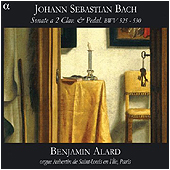
DEFINITIVE RECORDINGS

When listening to these organ masterpieces today, it is hard to believe that Johann Sebastian Bach actually composed them as organ study
works for his eldest son Wilhelm Friedemann, who had already mastered the harpsichord by playing his father's Well-Tempered
Clavier, and who now, at the age of 15, had to master the organ so as to be able to partake in the weekly Sunday Cantata
performances, by playing the obbligato organ part. Wilhelm Friedemann eventually became a great organist, understandably so if these
intricate Trio Sonatas formed the bulk of his studies.
I myself played some of these Trio Sonatas many years ago, and although they may sound simple compared to his impressive Toccatas and
Fugues, they are actually more difficult in that the three individual parts (they are based on Italian chamber sonatas for 3 instruments),
the two keyboards and pedals are constantly involved in the musical discourse. Most of the large Preludes and Toccatas are in 2 parts,
with the pedals acting only as harmonic foundation and support. On the other hand, in the Trio Sonatas, at any given moment, the pedals
become the leading voice while the hands move on to something else. The counterpoint is always shifting from part to part, and you
need to be a master organist in order to achieve that perfect balance at all times, not only musically, but also through the use of
the organ's registration.
The young organist Benjamin Alard not only demonstrates a natural musical ability, but also an acute sense of
timbral contrasts assigned to each individual part. His choice of stops throughout the six different sonatas is always intelligent
and in keeping with the style and nature of each individual movement. At the age of 24, he is already one of the leading figures
of the new baroque generation. The instrument used in this recording is a Bernard Aubertin organ, built in 2005,
in the Eglise Saint-Louis en l'île in Paris. The pipes speak with a pure, bright and yet mellow tone. It has 51 stops and its
construction was influenced by the Silbermann and Hildebrandt schools of organ building. There are 8 stunning photographs of this
beautiful new instrument inside the CD booklet and very informative text on both the music and the organ.
The recording was done in November of 2008, and captures the organ's clean sound beautifully, and lets the natural acoustics of
the building play a part in the overall quality of the sonics. The label Alpha celebrates 10 years in 2009. Let's
hope they are still around in 50 years!
The video below features Alard on the Aubertin Organ in the Eglise Saint-Louis en l'île in Paris.
Jean-Yves Duperron